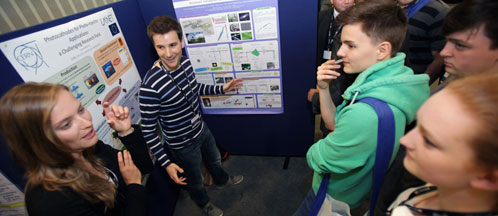ALBA Synchrotron

An international Symposium on Lasers and Accelerators for Science & Society took place at the end of June in the Liverpool Arena Convention Centre. The event was organized by the LA³NET and oPAC consortia which have received funding from the EU-7FP.
The Symposium was coordinated by Prof. Carsten P. Welsch of the University of Liverpool and the Cockcroft Institute in Daresbury, an internationally renowned centre for accelerator science and technology. The event was a sell out with delegates comprising 100 researchers from across Europe and 150 local A-level students and teachers. The aim was to inspire youngsters about science and the application of lasers and accelerators in particular.
'Discovering the unknown', 'innovation', 'beating cancer', ‘pioneering new technology', 'a possible career' – these were comments from sixth-formers, who among researchers, students and general public, attended the Symposium.
It is now possible to share their enthusiasm through online presentations, which includes talks from renowned scientists such as Professor Victor Malka (LOA, France), Dr Ralph Aßmann (DESY, Germany) and Professor Brian Cox (University of Manchester, UK), best known to the public for his television programmes about the origins of the universe.
The Symposium also showcased a portfolio of projects from researchers at the forefront of this exciting field of science and engineering through an interactive poster session with questions and answers, giving young people the opportunity to see how scientists just a few years older than themselves are pushing back the boundaries of knowledge.


Accelerator science has applications across all sectors of industry and healthcare, allowing us to accurately target cancer tumours, understand the structure of biomolecules such as proteins and complex chemicals, measure strain in jet engines, create new materials and understand the secrets of the universe itself.
ALBA is a full partner beneficiary of the oPAC network, hosting two fellows in projects for the optimization and better understanding of synchrotron light sources: Laura Torino in advanced diagnostics instrumentation and Michele Carlà in non-linear beam dynamics. Both projects with excellent results, having provided strong training to both trainees and with very good scientific results, with several papers and invited talks in international conferences.
In addition, ALBA hosted in Barcelona in 2013, the important EU Mid Term Review meeting where the project was evaluated, with excellent results, by the EU officials.
The presentations from the Symposium are now edited and available here.